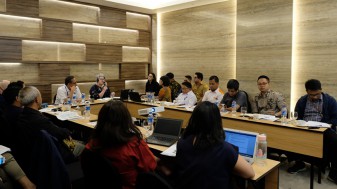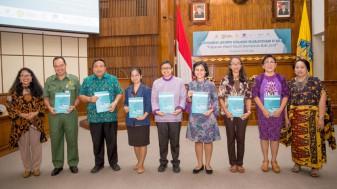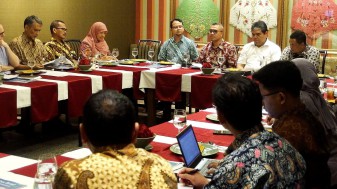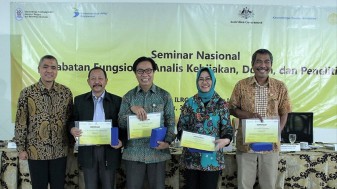The findings of rapid research can promote evidence-based policymaking, which will help develop responses to the rapidly changing situation arising from the impact of COVID-19 pandemic. Innovation is needed to tackle divergent obstacles faced when carrying out rapid research during a pandemic and to make sure that results from such research will be accurate.
The effectiveness of the results of the rapid research to support evidence-based policy-making was the topic of discussion for KSIxChange # 28 with the theme "The Effectiveness of Rapid Research in the Covid-19 Pandemic Era," held on Tuesday (29/9). The resource people for this online discussion, which was held by Knowledge Sector Initiative (KSI), included the Acting Secretary of the Ministry of Research and Technology/National Innovation Research Agency Mego Pinandito, the Principal Expert Policy Analyst of the Ministry of Health Siswanto, the Program Manager of Article 33 Indonesia Agus Pratiwi, and the Research Coordinator for the Partnership for Australia Indonesia Research (PAIR) from the Australia Indonesia Center, Hasnawati Saleh. Meanwhile, the moderator for this discussion was Leonardo Teguh Sambodo, the Director of Industry, Tourism and Creative Economy of the Ministry of National Planning and Development (Bappenas).
Counsellor Aedan Whyatt from the Australian Embassy in Jakarta in his remarks said that Covid-19 was a challenge that had severely affected health and economic sectors. It provided important lessons about the need to increase awareness and demand for evidence-based policies. Research, including rapid research, was very much needed to promote evidence-based policy making. He stated that in conducting rapid research, the quality, reliability and accuracy of the data were paramount. If the data was incomplete, the results of the research would be also incomplete, and the policies informed by such data would be consequently ineffective. “It is important to discuss this today," he said.
The Program Manager of Article 33 Indonesia Agus Pratiwi said that her organization had conducted rapid research since before the pandemic. The research was carried out between 2 and 5 months. How long the research should be depended on the urgency of the research issues. “Issues must be responded immediately as this may be highly needed to develop or amend a policy. If the research takes too long, this momentum will be lost and soon become irrelevant," she explained.
During the pandemic, her organization also conducted a number of rapid studies which initially completely unrelated to the pandemic. However, considering the impact of the pandemic, relevant issues were included to be covered by the research. When conducting rapid research related to the Vocational High School (SMK) road map, for example, Article 33 included a change in the priority market for the industrial sector as a consequence of the pandemic. This needed to be anticipated so that the policies that would be developed later could be adjusted to the existing situation.
Regarding the challenges of conducting research during a pandemic, he revealed that quantitative research would have to rely very much on the availability of secondary data for their analysis. As for qualitative research, data collection process was constrained because researchers could not go to the field. Innovation was needed to enable researchers capture the sensitivity in the field. In areas with good internet connection, researchers could contact their informants via Zoom or Whatsapp video. However, in areas where that was not the case, researchers had to rely on their recording device. Apart from maintaining data quality, the implementation of the research had to also apply the perspective of gender equality and social inclusion.
The Research Coordinator of Partnership for Australia Indonesia Research (PAIR) Hasnawati Saleh said that initially PAIR only focused on long-term research. However, looking at the impact of the pandemic, she felt the need to move quickly, thus deciding to do a rapid research. "The government and the community must respond quickly and appropriately. Apart from good leadership, responses have to be informed by evidence or science. You need to move fast, but you must not neglect the academic principles," she said.
PAIR also launched a small-scale rapid research to be conducted within a 12 weeks’ timeline. This aimed at producing results in a relatively short time to address the current policy challenges, thereby providing input to the government, particularly regarding the impact of the pandemic in all sectors. PAIR offered such rapid research services in all regions in Indonesia. Although data collection was constrained by limited mobility, PAIR managed to make a number of innovations to allow a smooth process of data collection. "You can rely on the onsite staff, virtual meetings, or if you can't use Zoom, you can create a Whatsaap Group and so on," she explained.
The Acting Secretary of the Minister of Research and Technology / National Innovation Research Agency Mego Pinandito said, from the policy makers' perspective, field data and information had to be collected quickly to help identify the current situation due to the impact of the pandemic. In that context, rapid research would be very useful if from the outset the research targets and timeframes had been clearly established. “The results of rapid research are highly needed as they can somewhat inform policy-making," he said.
According to the Ministry of Health's Principal Expert Policy Analyst, Dr. Siswanto, rapid research could be carried out to evaluate among others a policy or a community service program. When applied to evaluate the implementation of the health protocol, for example, this rapid research can quickly identified whether the community was compliant or not. Rapid research had also been conducted to evaluate the delivery of basic health services at community level (Puskesmas) during the pandemic. The research concluded that the level of service delivery went down as people were afraid to go to Puskemas. The findings could be used to inform policy-making that would allow people to access the basic health services during a pandemic. "With Covid 19, many research can be conducted, which result in the form of information and data, useful to inform policy-making," he said.
Closing the interactive session, the moderator, Leonardo Teguh Sambodo the Director of Industry, Tourism and Creative Economy of Bappenas revealed that in the current pandemic situation, rapid research should be the first step taken to deal with the national problems, considering that all the Covid-19 responses needed to be supported by efficient, well-targeted and effective policies. Collaboration and the use of technology provided a way to adapt research to the current pandemic situation which limited mobility and disabled the very much needed face-to-face discussions, and to help produce research results relevant to the need for policy recommendations for ministries/agencies, especially in the effort to respond to Covid-19
KSIxChange is an interactive discussion initiated by Knowledge Sector Initiative (KSI), a partnership between the Indonesian and Australian governments with funding from the Australian Department of Foreign Affairs and Trade (DFAT). KSIxChange, which is held at least once a month, aims to support the implementation of government programs by facilitating and promoting public deliberation pertaining to the use of evidence in the policy-making process.





